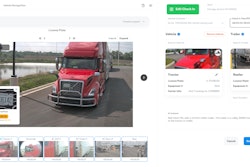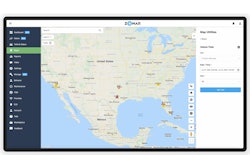Artificial Intelligence has entered the mainstream mindshare among fleet decision-makers, and supply chain businesses are reporting high AI readiness.
Among emerging technologies, including mobility services/shared assets, drones and blockchain, AI has stood out, officially entering the mainstream with a Fleet Technology Index (FTI) score of 53.5, according to new data from Escalent’s Fleet Advisory Hub insights tool that explores the needs, expectations and emotions of commercial vehicle and fleet decision-makers to measure market readiness for technologies.
Scaled from 0 to 100, a 100 FTI score indicates full adoption and the most positive ratings for a technology, while a score of 50 is considered the critical halfway point.
According to the 2025 Agility Index research study from Epicor and Nucleus Research, 56% of supply chain businesses survey reported high AI readiness, with many scaling AI across operations and modernizing their data systems to improve agility and reliability. The index, which included respondents from the U.S., Canada, UK/Ireland, Southeast Asia, Australia/New Zealand and the UAE, revealed that more than 90% are actively creating or investing in AI-specific roles. This suggests that organizations already leveraging AI tools are also the most likely to invest in building dedicated AI talent pipelines, the report noted.
“AI is becoming an essential tool in helping supply chain businesses anticipate and respond to inevitable change,” said Kerrie Jordan, chief marketing officer and senior vice president of product at Epicor. “We’re seeing organizations unlock the agility needed to lead through disruption by not just deploying AI but by building a digital foundation and workforce behind it.”
The study shows that companies are investing in platforms that connect and analyze operational data, with 50.6% of respondents using these data intelligence tools. Companies using them were 1.4 times more likely to have adopted AI applications, the study said.
AI is not a standalone technology project, Jordan said, as success depends on several factors, including organizational readiness, leadership engagement and the ability to act on predictive insights.
“Investing in AI and data-centric platforms is changing how quickly companies can respond to disruption and optimize decisions,” she said. “As AI matures and time to value approaches zero, these companies will outpace competitors. They will be able to make decisions in minutes, not months, with systems that adapt as fast as the market shifts.”
And the competition is getting stiff as smaller fleets adopt more technology, including AI.
“Larger fleets lead as early adopters, but it’s the smaller fleets, which form the majority of the market, that are now actively evaluating and embracing these technologies with increasing positivity,” said Lucas Lowden, an automotive and mobility insights consultant at Escalent.
Small fleets’ aggregate core technology score has risen 23% year-over-year to a 54.6 FTI score. Their scores for data analytics and telematics have surpassed the halfway point with FTI scores of 66.2 and 59.7, respectively.
“The market shift has significant implications for providers. Up until now, providers have targeted large, capital-rich fleets, but now they must adapt their messaging and positioning to resonate with the distinct needs of smaller fleets,” said Dania Rich-Spencer, a vice president in the automotive and mobility group at Escalent.
“And the time for them to act is now. Businesses expect to implement technologies like data analytics and telematics four to five months sooner than they did in 2024. This reduced time frame to expected use has been supercharged by heightened receptivity, an improved business environment and greater confidence in these technologies.”
And the FTI suggests that AI implementation could come quick, too.
AI’s FTI score exceeded that of telematics, which is considered a core technology. Telematics scored a 48.2, still not quite hitting the halfway point. Among the four evaluated core technologies, data analytics topped the list with a score of 55.7. Battery electric vehicles rebounded to a score of 44.3 after losing momentum the previous year, and autonomous vehicles are performing more like an emerging technology than a core technology at a score of 31.3.
Escalent’s overall FTI score for both mainstream and emerging technologies has increased by 83% in the last six years.










